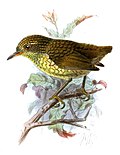| Ruddy-tailed flycatcher | |
|---|---|
 | |
| at Rio Branco, Acre state, Brazil | |
| Scientific classification | |
| Kingdom: | Animalia |
| Phylum: | Chordata |
| Class: | Aves |
| Order: | Passeriformes |
| Family: | Onychorhynchidae |
| Genus: | Terenotriccus Ridgway, 1905 |
| Species: | T. erythrurus |
| Binomial name | |
| Terenotriccus erythrurus (Cabanis, 1847) | |
 | |
The ruddy-tailed flycatcher (Terenotriccus erythrurus) is a small passerine bird in the family Onychorhynchidae. [2] It was previously place in family Tityridae. Its range extends from southeast Mexico south to the Amazon rainforest. It is the only member of the genus Terenotriccus, but some authorities place it in genus Myiobius . However, it differs in voice, behaviour, and structure from members of that group.

